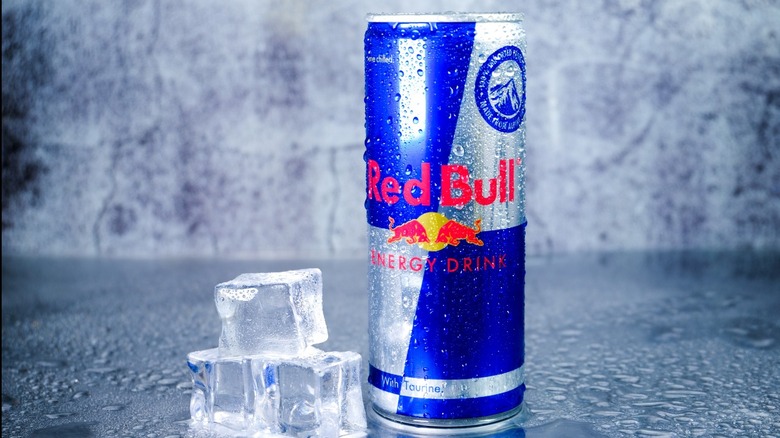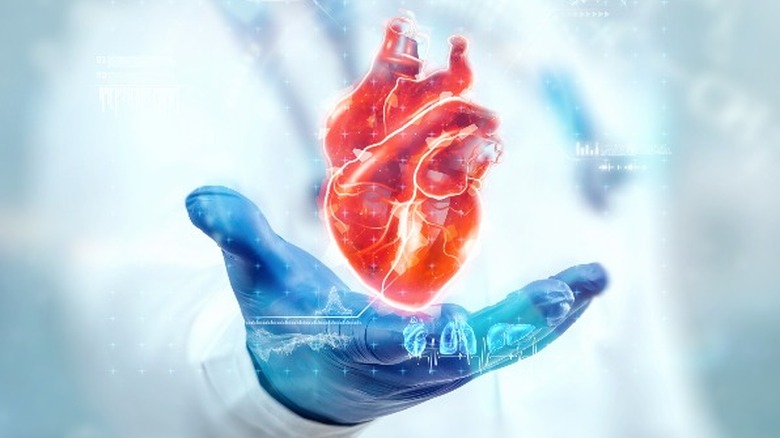Can You Get Addicted To Energy Drinks?
If you could have any superpower, what would it be? According to a 2018 poll of over 2,000 adult Americans, 16% of the country wished that they could fly. One well-known brand has used clever marketing to tap into the American dream of flying by selling the power of flight through an energy drink.
Red Bull — the highest-selling energy drink brand in America — is known for its slogan: "Red Bull gives you wings" (per Statista). The world-famous energy drink brand aligns itself with extreme sports that feature athletes who often take flight in spectacular ways. Surfers, skaters, skiers, snowboarders, and various X Games athletes alike can be seen holding a can of Red Bull in their hands during their post-heat interviews. It might make you wonder: Will an energy drink actually help me take flight like these gifted athletes?
Of course, energy drinks cannot actually make you fly. In fact, energy drinks have a more dangerous, and less glamorous side that marketing companies tend to gloss over.
The neuropsychology of energy drink addiction
An energy drink is a liquid refreshment that contains doses of caffeine, sugar, and legal stimulants like guarana, L-carnitine, and taurine (via Centers for Disease Control and Prevention). According to National Center for Complementary and Integrative Health, while energy drinks may boost your focus, physical endurance, and reaction time, they also pose several negative consequences.
While energy drinks are not commonly thought of as addictive substances, it turns out it is possible to get addicted to them. Healthline states that if you drink too many energy drinks and can't seem to limit your intake, you might be addicted. Other signs of an energy drink addiction include intense cravings and withdrawal symptoms, like headaches or moodiness. But how is an addiction to energy drinks possible?
According to Healthline, psychology and neurochemistry play a role. You may become mentally addicted to an energy drink by associating it with performance. For example, you might say to yourself, "I cannot work out as well without my energy drink." Energy drinks may also cause dependence via the release of dopamine — the more you drink, the more intense the feel-good response. Over time that feeling becomes fleeting, leading you to drink more in pursuit of that good feeling. Beyond the negative aspects of addiction, energy drinks can be downright bad for your overall health.
Health risks associated with energy drink consumption
Energy drinks can lead to a number of conditions that could potentially threaten your health and quality of life. According to National Center for Complementary and Integrative Health, the ingredients in energy drinks can make you feel anxious or nervous. It's no surprise then that these feelings of anxiety could also keep you up at night. Further, energy drinks can also dehydrate you.
But did you know that consuming an energy drink can lead to hospitalization? Excessive doses of energy drinks can seriously impact your heart, leading to irregular heart rhythms, and can even lead to heart failure (via Centers for Disease Control and Prevention).
Weekly consumption of energy drinks is also correlated with other risky behaviors. According to a 2016 study published in the Journal of Caffeine Research, young adults who reported drinking a minimum of one energy drink per week were also more likely to have unprotected sex, smoke cigarettes, and consume illicit drugs like cocaine.
To avoid side effects, you may need to take the time to safely wean yourself off of energy drinks. If your symptoms are causing you concern, reach out to a doctor right away.



